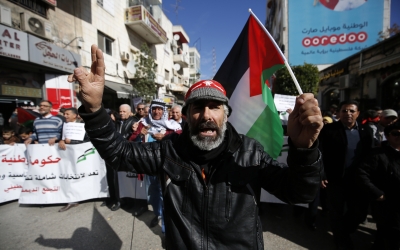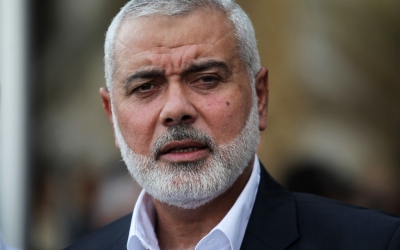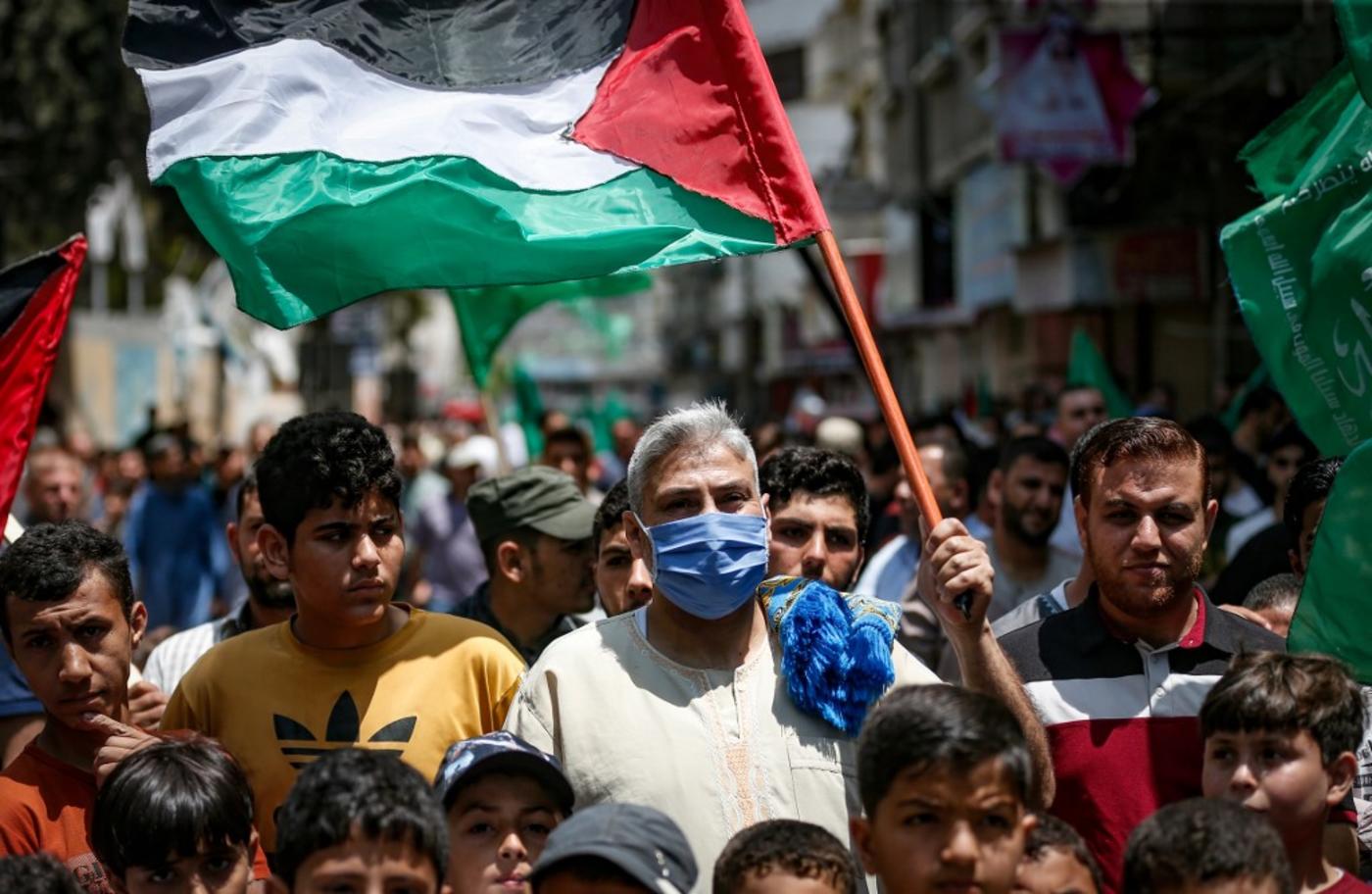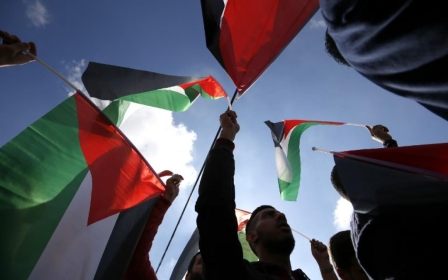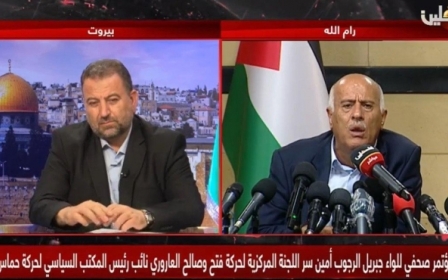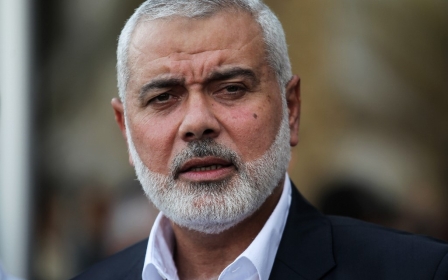Hamas’s Haniyeh: ‘No mercy’ for Arab states who betray Palestinian cause
History will show no mercy to the Arab nations that recognise Israel, Ismail Haniyeh, the political leader of Hamas, has told Middle East Eye.
Asked about the recent “normalisation” pacts agreed with Israel by the United Arab Emirates and Bahrain, Haniyeh said that any deal an Arab country makes with Israel will eventually threaten that country.
“We know Israeli leaders better than them. We know how they think. We would like to tell our brothers in the United Arab Emirates that they will lose as a result of those agreements because Israel’s only interest is to seek a military and economic foothold in areas close to Iran,” Haniyeh said.
“They will use your country as a doorstep. We don’t want to see the UAE being used as an Israeli launchpad.”
Haniyeh described the Emiratis as “brothers” who had supported the Palestinian cause historically and said Hamas looked forward to the day when they dissociated themselves from the agreement.
“The Zionist project is an expansionist project. Its objective is to create a greater Israel. We don’t want to see the Emiratis or the Bahrainis or the Sudanese being used as vehicles for this project. History will show no mercy, the people will not forget, and humanitarian law will not forgive,” he said.
The Emirati and Bahraini agreements with Israel, which were signed at the White House last month, have prompted speculation that Saudi Arabia could be preparing to follow its two close Gulf allies’ lead.
Last week, Prince Bandar bin Sultan, who served as Saudi ambassador to Washington for over 30 years, described Palestinian leaders as failures who had consistently missed opportunities for a settlement with Israel.
His remarks, in an interview with the state-run al-Arabiya TV, were interpreted as a sign of a softening of King Salman’s policy of refusing to recognise Israel before a Palestinian state is created.
They represent the position of the crown prince, Mohammed bin Salman, for whom both Bandar’s daughter and son work as ambassadors in the US and UK respectively.
Security cooperation winding down
Haniyeh said Hamas had detected “positive changes” on the ground in the West Bank as a result of reconciliation talks with rival Palestinian faction Fatah aimed at forming a national unity government.
Haniyeh admitted the challenges were enormous: “We witnessed positive changes on the ground. I do not want to sound over-optimistic and pre-empt events but there are positive things. The challenges are enormous and we are still at the beginning of the road.”
Senior Palestinian sources told MEE that the PA’s security cooperation with Israel in the West Bank had “almost” stopped.
The recent arrest of Sheikh Hassan Yousef, a senior Hamas leader, who spent a total of 21 years in prison, was condemned by Fatah’s Jibril Rajoub who is leading negotiations with Hamas.
They said there was formal coordination between Palestinians and Israelis over the movement of officials, but the arrests of Hamas leaders released from prison had stopped and local groups were allowed to celebrate their release and wave Hamas flags publicly.
Hamas has also been encouraged by what it has heard in its own closed-door sessions with Fatah, one of which took place in Beirut and the other in Ankara recently.
“What we hear from them in closed meetings is that they stress the importance of Hamas taking part, because Hamas has a right to be involved in the day-to-day running of the government,” Haniyeh said.
Haniyeh said Hamas had been vindicated by the collapse of the Oslo peace process, based on the 1993 agreement between the Palestine Liberation Organisation (PLO) and Israel which created the Palestinian Authority but entrenched Israeli military control over much of the occupied West Bank and failed to halt the expansion of Israeli settlements.
“From the day it was announced, Oslo bore the seeds of its own destruction… Oslo was a failure from day one because it was a security agreement, not a political one,” he said.
Oslo had died, Haniyeh said, when both its signatories, Israeli Prime Minister Yitzhak Rabin and PLO leader Yasser Arafat, were killed.
Rabin was assassinated by an Israeli ultra-nationalist in 1995, while Arafat’s death in 2004 is alleged by some to have been a result of poisoning.
“Abu Mazen [PA President Mahmoud Abbas] himself, who engineered Oslo, has announced abandoning Oslo and therefore, yes, we feel vindicated,” said Haniyeh.
“We could have saved time had the PA recognised early this disaster. Had it been overturned early on, we would have saved our people the miseries they endured. But better late than never."
Haniyeh said that even when Hamas issued a political document expressing its readiness to accept a Palestinian state based on the 1967 borders, it did so on the condition that the rights of the Palestinians would not be relinquished.
‘Nothing left for Abu Mazen to bet on’
Senior Palestinian officials admit there is no love lost between Abbas, the president of the PA since 2005, and Hamas. They wryly recall a “reconciliation” meeting hosted by Qatar in 2017 when the Hamas delegation came prepared for a wide-ranging discussion.
What they got from Abbas was an order that they allow Fatah delegates from Gaza to attend a party conference in Ramallah. In the car back from the meeting, Hamas delegates agreed there would be no reconciliation while Abbas was still alive.
But this time round, powerful forces are pushing Fatah into the arms of Hamas. Haniyeh told MEE that three factors had forced Abbas to rethink his approach.
“Firstly, nothing is left for Abu Mazen to bet on. Secondly, Abu Mazen feels personally insulted by the Americans and the Israelis. Thirdly, there was a decision by the Arab League to bypass the PLO and make peace with Israel."
The Arab League last month dropped a draft resolution condemning the Israeli-UAE agreement.
“In other words, the Palestinian Authority was no longer necessary as a bridge for the Israelis to make peace with the Arabs, while at the same time the PA felt abandoned by its Arab brothers, both politically and financially.
“These factors… made Abu Mazen think he needed to find a new approach. Hence his positive response to the initiative by Hamas,” Haniyeh said.
Haniyeh said that Hamas and Fatah are considering running a joint list in Palestinian elections set to take place next year for the first time since the 2006 vote that left Hamas in control of Gaza and led to armed clashes between the factions in which hundreds died.
Such a move would be attractive to Fatah, which fears being wiped out at the ballot box after years of unpopularity.
Talking to Dahlan
Haniyeh also clarified details about Hamas’s contact with Mohammed Dahlan, the former security chief in Gaza who led Fatah’s forces during the fighting in 2006 and 2007.
Dahlan, now exiled to Abu Dhabi where he is an adviser to Crown Prince Mohammed bin Zayed, has been touted in some American and Israeli circles as a potential next leader of the Palestinian Authority despite his bitter rivalry with Abbas.
Last month, Israel's Hayom newspaper quoted US Ambassador David Friedman saying that Washington was considering supporting Dahlan as the next Palestinian president, before withdrawing
Haniyeh said that Yahya Sinwar, Hamas’s elected leader in Gaza, had held talks with Dahlan in Cairo in 2017 at a time when relations with Abbas and the PA were frozen.
Dahlan said at the time he expected the agreement to lead to opening Gaza’s border with Egypt and an end to the blockade.
“The discussion with Dahlan focused on one main point - how to alleviate hardship in Gaza. There was no discussion whatsoever about any political issues including the form of the Palestinian cause,” Haniyeh said.
Dahlan had also helped Hamas’s relations with Egypt and had agreed to settle cases with multiple families who had lost relatives during the Fatah-Hamas fighting, paying them about $50,000 each and $5 million in total, Haniyeh said.
“Was this a barter for something else? No. Hamas never promised anything in exchange. We always insisted that Palestinians should choose their leadership,” he said.
A Palestinian source with knowledge of Sinwar’s relationship with Dahlan discounted the suggestion that there was a bond of friendship between the two, dating back to their student days.
Sinwar, Haniyeh and Dahlan were all students in the Islamic University in Gaza where Dahlan headed the Shabiba or Fatah youth faction and Sinwar led the Islamic youth faction.
In the run up to the first Intifada in 1987, and before the formation of Hamas, there were frequent clashes between the two groups of students, until one day a professor affiliated with the Islamic faction was killed.
“Sinwar beat Dahlan up so badly, Dahlan had to stay in hospital for 45 days. He hates him,” the source said.
Prisoner exchange
Haniyeh confirmed that Egypt was currently negotiating a proposed prisoner exchange with Israel. An Egyptian delegation had conveyed Hamas’ demands to Israel and Hamas was waiting to receive a “clear response”.
He said Hamas was prepared for a fresh attack on Gaza and warned that any future war was going to be costly for Israel.
“In six years [since the last major conflict in 2014] Hamas’s capabilities are a lot better and we have surprises for the enemy. So waging war is not an easy decision for Israel. It is going to be costly.”
Addressing the seizure of Palestinian territory by Israeli nationalist settlers who claim to be returning to lands inhabited by their ancestors, Haniyeh said: “The land belonged to us long before them.
“We are talking about a land engraved in our history, we are talking about Jerusalem, which was the first Qibla [direction in prayers] for Muslims and was the place to which the Prophet Muhammad was taken on a nightly journey [when Muslims believe he ascended to heaven]; we are talking about the Palestinians who belonged to the land long before the Zionists arrived from Europe.
“We will never give up our homeland or concede any part of it. We will spare no effort to liberate it, and what we cannot liberate we will leave for future generations to liberate.
“Even with Oslo, Israel showed it was not a country which is in pursuit of peace. The nature of the Zionist movement is to promote itself through force. It does not respect human rights or the norms of international law. Might is right for them."
Hamas was not holding its breath for a Joe Biden victory in the US presidential election, even though Haniyeh said Donald Trump had been the worst leader in the history of the United States.
“US foreign policy does not change with the change of the President. It's deeply entrenched in the US deep state. US foreign policy is an institutional, not an individual matter,” he said.
This article is available in French on Middle East Eye French edition.
Middle East Eye propose une couverture et une analyse indépendantes et incomparables du Moyen-Orient, de l’Afrique du Nord et d’autres régions du monde. Pour en savoir plus sur la reprise de ce contenu et les frais qui s’appliquent, veuillez remplir ce formulaire [en anglais]. Pour en savoir plus sur MEE, cliquez ici [en anglais].


